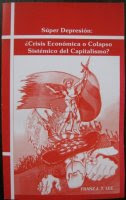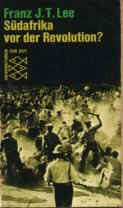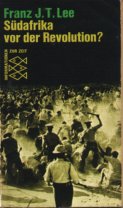Could Venezuela see her future in the oily crystal ball of Libya?
By Franz J. T. Lee
The Twilight of the 'Wretched of the Earth'
What is behind the series of popular uprisings in North Africa and the Middle East? What or who triggered them off? The CIA or hunger, or both? And 'Cui bono?' - whose interests do they really serve? Is Venezuela next? Can she see her future in the oily crystal ball of Libya, of Gaddafi?
The capitalist system globally has reproduced itself in all walks of life; it has internalized itself in the very psyche of the 'wretched of the earth'. By sacrificing their very lives millions defend and save their future butchers, the new ruling classes. Hunger, famine and poverty have been magnified ever since the original accumulation of capital, they are root causes of many popular revolts. What is special, new about the current uprisings? Are we making revolution and/or human emancipation, the New?
These and many other questions have seriously to be studied in Venezuela. Like in the 1960s very easily the African sparks could set the American prairie on fire. The common factors of Venezuela and Libya are dangerously similar: 'dictators' who are producing bloodbaths for their peaceful, poor citizens. Apart from these, they have oil, gas, water (under the Sahara Desert and in the Orinoco Delta), oxygen, strategic metals and minerals but also exotic hot weather and blue skies, still void of toxic 'chemtrails' and HAARP geophysical terrorism.
Just to possess the greatest oil reserves of the world is reason enough to receive bellicose royal treatment from the Fourth Fleet or NATO.
Hence, Venezuela, beware!
Let us look at some aspects of the current uprisings in Africa.
Foremost, in the current epoch of the post-Orwellian global disaster, what should be studied and debated urgently before we, the 'wretched of the earth', as international working classes, could get down concretely to emancipate ourselves as still breathing and fighting humanity? It is pertinent to identify the real global syndicates of organized war crimes and not to be fooled by bourgeois ruling class ideology and practices; in modern terms, by the Murdoch Empire, which preaches that 'Great Men', ... that is, 'dictators', like 'Muammar Gaddafi' or 'Hugo Chavez Frias', or 'saints' like 'Bush I and II, ... who were both losers but they 'took it all' ..., that is, that these 'great heroes' of the 'fatherland' all alone could make or break history. The problem is that most of us, but also the billions of the 'wretched of the earth' believe in such ideological, messianic, political grandeur. Che Guevara, Fidel Castro, Frantz Fanon, Bertolt Brecht and Ernst Bloch have taught us, as a result of rigorous, stringent, theoretical analysis, that emancipated 'Man' should not strive to be 'great', not become a 'great dictator', but rather a homo novum, a New Man, the New per se. In the current corporate vandalism in Africa, especially in the land-grabbing, we could perceive that nowhere the new, the hopeful, the emancipatory, are on the agenda of the African Union, NEPAD, Africom or the 'African Standby Force' (ASF).
The latter is opening a new market for a flourishing arms sales industry in Africa, to serve the belligerent necessities of United Nations' 'peace-keeping' forces on the continent, but also violently to keep a macro-migratory exodus in search for food at bay.
Yes, corporate imperialism is not interested in the millions of starving children, in the spreading of pestilence, illness and AIDS, the new black elites just talk about business, about Great Business, about arms production in South Africa, corruption, about preparing for Great Wars.
Neither on the placards nor in the political speeches of the revolting, starving masses in North Africa and the Middle East, could be detected traces of the radical anti-capitalist New. It seems that the quo vadis, the whither, the future of whole Africa is truncated by world fascism. It seems that twilight is darkening the 'Cradle of Humanity'.
The major demand of all uprisings was that a dictatorial great man must step down from decades of autocratic power.
For pharisaic reasons, even Berlin and Washington D.C. favored and defended this 'human right'; all over the army and the State continued to serve the metropolitan interests of their corporate masters.
Venezuela and Libya, we should recall that
there exists no revolution without 'violent' class struggles. If the latter are absent in any region, or if we try to annihilate workers' class struggles on a continental scale, then this is the best proof that no social revolution is taking place there. Class reconciliation is not revolution, it is capitulation.
With emancipatory transhistoric processes the situation is more transcendental. There is no human emancipation possible when anywhere still exist labor and capital, master and slave relations, that is, exploitation, domination, racism. genocide and alienation. At the end of the first millennium, early North African and Arab materialist philosophers like Avicenna and Averroes, were already expressing the creative quintessence of human emancipation as natura naturans and natura naturata, namely, as that what is created, creative and creating, that is, Mother Nature, Mother Africa, Pacha Mama, Gaia and Isis. Creation signifies theoretical Praxis, the emancipation of Mother Nature, Mother Africa, the New, of the Woman.
The Novum is the emancipatory specter that is haunting the contemporary world order, it could be setting North America also ablaze. Since centuries capitalism brutally suppressed all possible emancipatory endeavors. Corporatism launched an avalanche of physical and mental holocausts to control the toiling masses. Since yore, the masters called these authoritarian and totalitarian machinations and mechanisms humanism, peace, education, transition, democracy, 'one world government', culture, faith, good manners, etiquette, civilization, customs, credos, commandments, laws, morals, ideology and religion.
The low degree of class consciousness and the high level of inculcated ignorance about socialism by no means belittle the courage, optimism and heroic resistance of all the contemporary workers' struggles. However, it is important to note why corporate imperialism could silence these brave fighters again, can 'nip them in the bud'. This occurred in all the social democratic revolutions of the 20th century. Today, where are the novel, creative fruits of the heroic social revolutions of Vietnam, China, Yugoslavia, Algeria, Egypt, Libya, Congo, Guinea-Bissau, Ghana, Eritrea, Djibouti, Mauritania, Mozambique, Angola, Zimbabwe, Namibia and South Africa?
Is the current state of affairs in Africa the freedom for which we fought ... for which many millions 'peacefully' were maimed, mutilated and massacred? In Africa, are we confronting a new maafa (Swahili: disaster), a new type of Conquest, a modern Transatlantic Wage Slave Trade, a new Bermuda Triangle? What is Africom doing on the soil of Mother Africa, and why did we, a billion African human beings, allow it to settle there to kill us 'softly' one by one?
If our autocratic, theocratic, technocratic and bureaucratic 'great leaders', especially those in Humania South, could be accepted by corporate America, then by the grace of the 'great gods', who own 'great ideas' ... and by the 'superiority of the great master races' ... they would be ordained as the loyal guardians, the fascist 'storm troopers' of the apocalypse', as the Chief Executive Officers of the oil, gas, gold, metal and mineral supply and shipment to the USA, to the metropolitan opulent tycoons.
However, the danger is that we see all over colorful 'revolutions', hundreds, millions of them. We do not realize that there is only one single revolution: the capitalist, bourgeois, democratic revolution, the father of all reformist vipers.
In his writing, 'The Jewish Question', as early as 1843, Marx himself informed us that our objective is to topple bourgeois revolution by means of proletarian human emancipation.
In the epoch of globalization where systemic revolutions are already becoming obsolete, we should seriously reflect and think about our basic liberatory concepts, about their corresponding anti-capitalist praxis.
As far as we could reflect, publicly, nowhere in the recent popular uprisings, the capitalist mode of destruction has been negated radically, is being transcended towards the real, true New, towards planetary emancipation.
On the 'Dark Continent' the Twilight of the 'Wretched of the Earth' is casting an obscure anticipatory awakening on the northern part of the continent; soon dusk will set in and remind us of how black, how mysterious, the natural nights could still be.
http://www.franzlee.org.ve
franz@franzlee.org.ve
By Franz J. T. Lee
The Twilight of the 'Wretched of the Earth'
What is behind the series of popular uprisings in North Africa and the Middle East? What or who triggered them off? The CIA or hunger, or both? And 'Cui bono?' - whose interests do they really serve? Is Venezuela next? Can she see her future in the oily crystal ball of Libya, of Gaddafi?
The capitalist system globally has reproduced itself in all walks of life; it has internalized itself in the very psyche of the 'wretched of the earth'. By sacrificing their very lives millions defend and save their future butchers, the new ruling classes. Hunger, famine and poverty have been magnified ever since the original accumulation of capital, they are root causes of many popular revolts. What is special, new about the current uprisings? Are we making revolution and/or human emancipation, the New?
These and many other questions have seriously to be studied in Venezuela. Like in the 1960s very easily the African sparks could set the American prairie on fire. The common factors of Venezuela and Libya are dangerously similar: 'dictators' who are producing bloodbaths for their peaceful, poor citizens. Apart from these, they have oil, gas, water (under the Sahara Desert and in the Orinoco Delta), oxygen, strategic metals and minerals but also exotic hot weather and blue skies, still void of toxic 'chemtrails' and HAARP geophysical terrorism.
Just to possess the greatest oil reserves of the world is reason enough to receive bellicose royal treatment from the Fourth Fleet or NATO.
Hence, Venezuela, beware!
Let us look at some aspects of the current uprisings in Africa.
Foremost, in the current epoch of the post-Orwellian global disaster, what should be studied and debated urgently before we, the 'wretched of the earth', as international working classes, could get down concretely to emancipate ourselves as still breathing and fighting humanity? It is pertinent to identify the real global syndicates of organized war crimes and not to be fooled by bourgeois ruling class ideology and practices; in modern terms, by the Murdoch Empire, which preaches that 'Great Men', ... that is, 'dictators', like 'Muammar Gaddafi' or 'Hugo Chavez Frias', or 'saints' like 'Bush I and II, ... who were both losers but they 'took it all' ..., that is, that these 'great heroes' of the 'fatherland' all alone could make or break history. The problem is that most of us, but also the billions of the 'wretched of the earth' believe in such ideological, messianic, political grandeur. Che Guevara, Fidel Castro, Frantz Fanon, Bertolt Brecht and Ernst Bloch have taught us, as a result of rigorous, stringent, theoretical analysis, that emancipated 'Man' should not strive to be 'great', not become a 'great dictator', but rather a homo novum, a New Man, the New per se. In the current corporate vandalism in Africa, especially in the land-grabbing, we could perceive that nowhere the new, the hopeful, the emancipatory, are on the agenda of the African Union, NEPAD, Africom or the 'African Standby Force' (ASF).
The latter is opening a new market for a flourishing arms sales industry in Africa, to serve the belligerent necessities of United Nations' 'peace-keeping' forces on the continent, but also violently to keep a macro-migratory exodus in search for food at bay.
Yes, corporate imperialism is not interested in the millions of starving children, in the spreading of pestilence, illness and AIDS, the new black elites just talk about business, about Great Business, about arms production in South Africa, corruption, about preparing for Great Wars.
Neither on the placards nor in the political speeches of the revolting, starving masses in North Africa and the Middle East, could be detected traces of the radical anti-capitalist New. It seems that the quo vadis, the whither, the future of whole Africa is truncated by world fascism. It seems that twilight is darkening the 'Cradle of Humanity'.
The major demand of all uprisings was that a dictatorial great man must step down from decades of autocratic power.
For pharisaic reasons, even Berlin and Washington D.C. favored and defended this 'human right'; all over the army and the State continued to serve the metropolitan interests of their corporate masters.
Venezuela and Libya, we should recall that
there exists no revolution without 'violent' class struggles. If the latter are absent in any region, or if we try to annihilate workers' class struggles on a continental scale, then this is the best proof that no social revolution is taking place there. Class reconciliation is not revolution, it is capitulation.
With emancipatory transhistoric processes the situation is more transcendental. There is no human emancipation possible when anywhere still exist labor and capital, master and slave relations, that is, exploitation, domination, racism. genocide and alienation. At the end of the first millennium, early North African and Arab materialist philosophers like Avicenna and Averroes, were already expressing the creative quintessence of human emancipation as natura naturans and natura naturata, namely, as that what is created, creative and creating, that is, Mother Nature, Mother Africa, Pacha Mama, Gaia and Isis. Creation signifies theoretical Praxis, the emancipation of Mother Nature, Mother Africa, the New, of the Woman.
The Novum is the emancipatory specter that is haunting the contemporary world order, it could be setting North America also ablaze. Since centuries capitalism brutally suppressed all possible emancipatory endeavors. Corporatism launched an avalanche of physical and mental holocausts to control the toiling masses. Since yore, the masters called these authoritarian and totalitarian machinations and mechanisms humanism, peace, education, transition, democracy, 'one world government', culture, faith, good manners, etiquette, civilization, customs, credos, commandments, laws, morals, ideology and religion.
The low degree of class consciousness and the high level of inculcated ignorance about socialism by no means belittle the courage, optimism and heroic resistance of all the contemporary workers' struggles. However, it is important to note why corporate imperialism could silence these brave fighters again, can 'nip them in the bud'. This occurred in all the social democratic revolutions of the 20th century. Today, where are the novel, creative fruits of the heroic social revolutions of Vietnam, China, Yugoslavia, Algeria, Egypt, Libya, Congo, Guinea-Bissau, Ghana, Eritrea, Djibouti, Mauritania, Mozambique, Angola, Zimbabwe, Namibia and South Africa?
Is the current state of affairs in Africa the freedom for which we fought ... for which many millions 'peacefully' were maimed, mutilated and massacred? In Africa, are we confronting a new maafa (Swahili: disaster), a new type of Conquest, a modern Transatlantic Wage Slave Trade, a new Bermuda Triangle? What is Africom doing on the soil of Mother Africa, and why did we, a billion African human beings, allow it to settle there to kill us 'softly' one by one?
If our autocratic, theocratic, technocratic and bureaucratic 'great leaders', especially those in Humania South, could be accepted by corporate America, then by the grace of the 'great gods', who own 'great ideas' ... and by the 'superiority of the great master races' ... they would be ordained as the loyal guardians, the fascist 'storm troopers' of the apocalypse', as the Chief Executive Officers of the oil, gas, gold, metal and mineral supply and shipment to the USA, to the metropolitan opulent tycoons.
However, the danger is that we see all over colorful 'revolutions', hundreds, millions of them. We do not realize that there is only one single revolution: the capitalist, bourgeois, democratic revolution, the father of all reformist vipers.
In his writing, 'The Jewish Question', as early as 1843, Marx himself informed us that our objective is to topple bourgeois revolution by means of proletarian human emancipation.
In the epoch of globalization where systemic revolutions are already becoming obsolete, we should seriously reflect and think about our basic liberatory concepts, about their corresponding anti-capitalist praxis.
As far as we could reflect, publicly, nowhere in the recent popular uprisings, the capitalist mode of destruction has been negated radically, is being transcended towards the real, true New, towards planetary emancipation.
On the 'Dark Continent' the Twilight of the 'Wretched of the Earth' is casting an obscure anticipatory awakening on the northern part of the continent; soon dusk will set in and remind us of how black, how mysterious, the natural nights could still be.
http://www.franzlee.org.ve
franz@franzlee.org.ve












